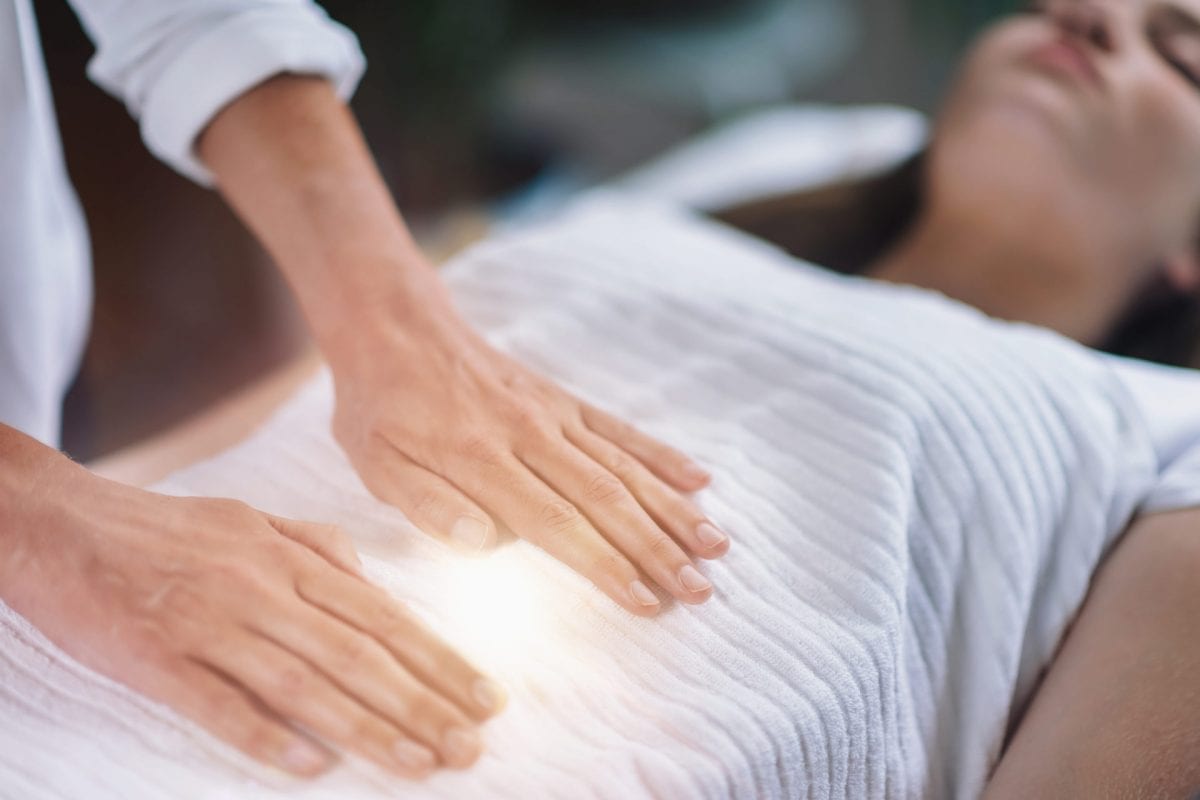Reiki, energy healing and chakras, oh my! All words that continue to trend as the importance of holistic health continues to gain traction but is reiki really a helpful practice? Or is it just a marketing ploy part that’s part of the multi-million-dollar wellness industry? Read on to learn more about the roots of reiki and why it’s all the rage.
What Is Reiki?
Another old practice (dating back to the late 1800’s/early 1900’s) that seems to be gaining popularity in practice (in India alone there’s a reported 1 million people practicing), reiki is a Japanese healing technique that works with different energy points in the body to help restore energetic imbalances that are believed to be causing/contributing to illness or disease.
It’s a natural, form of therapeutic practice that involves a certified/trained professional (aka a Reiki Master) gently placing their hands over/on a patient’s body to help transfer healing energy from the Master to the patient and help initiate more movement of the patient’s own energy.
Usually done lying down on a massage table or seated comfortably in a chair, it’s a 20-90 minute session in a quiet, peaceful setting (some people may prefer soft, relaxing background music while others practice in silence). Patients may be asked to remove all jewellery but can remain fully clothed and should have dialogue with the practitioner prior to starting the session to understand if there will be light touching at specific points or if it will just be hands moving over the body.
Generally done by a practitioner, people who study reiki can also perform it on themselves making it long-term, cost effective and simple healthy habit.

Developed in Japan by a Buddhist monk Dr. Mikao Usui, the word reiki loosely translates to “spiritually guided life force energy” (it’s derived from the combination of two Japanese words; rei which means “God’s wisdom or the higher power” and ki which means “life force energy”).
Throughout his upbringing, Usui had an interest in a variety of fields including medicine, theology and psychology and spent several years (before joining a monastery) traveling to study different forms of healing. Usui’s intention was to create a system of healing that could be accessible through being unattached to any formal religious practices but deeply rooted in spiritual principles.
Committed to bringing his intention to life but unclear on how, Usui went for a 21-day meditation, fasting and prayer experience in a cave and the sight of Ancient Sanskrit symbols helped him develop the system of healing (so though it was developed in Japan, there is an influence of Ancient India in it’s creation). After this awakening, Usui began to use reiki in his already established clinic for healing in Kyoto and word of his effective practices and teachings began to spread with it’s first formal clinic and school developed in Tokyo in 1922.
Fortunately, prior to his death, Dr. Usui taught several Reiki Masters and one Dr. Chujiro Hayashi further added to the practice by adding hand movements to the practice to help it cover more parts of the body and also taught a woman named Hawyao Takata who ended up bringing it to her home in the United States in the 1930’s.

What Are The Benefits Of Reiki?
There are is no hard, scientific-evidence on the benefits of doing reiki however, there’s nothing that demonstrates it’s harmful either (as it’s a non-invasive healing practice, there’s no interaction with any prescription medicine or formal medical plan). If you are navigating through any formal illness, it’s important to understand that reiki should not replace a licensed Doctor’s diagnosis or medical treatment plan however, it can be an additional, helpful therapy. and many patients report feeling more relaxed (and less stressed) after a session. After the session, you may be provided some feedback on areas of blockage or tension in the body (and sometimes suggestions on certain foods or activities to engage with or avoid).
Considering the amounts of chronic illness, mental illness and reported stress that continue to rise, non-invasive therapies that can be helpful in supporting a release of mental and physical stress are worth a try. In addition to a release of stress, other reported benefits from client experiences/case studies are that it helps improve sleep, assists the body in removing toxins, repairing the immune, increases the ability to concentrate and an increase in conscious awareness on the body’s ability to self-heal.
We are happy to report that after many years of hearing about reiki, we finally tried it during an extremely stressful time and it proved to be worth it.
We tried three different sessions (each with a different practitioner) and though they all brought their own, unique energy to the session, what they all had in common was a kindness that radiated from them and a gentle nature that felt healing even before the formal session began. We enjoyed the sessions so much that it’s a practice we will continue to explore and experience it; reiki is the real deal!
Main Image Photo Credit: www.amityvilleapothecary.com
Rachna Sethi
Author
Rachna (@thesassyspiritual) is a graduate of the Applied Mindfulness Meditation program from the University of Toronto, a certified Educator with two bachelor degrees and a diploma in Art Therapy. She's dedicated to living with a compassionate approach. Committed to helping people integrate Mindfuln...














































































































